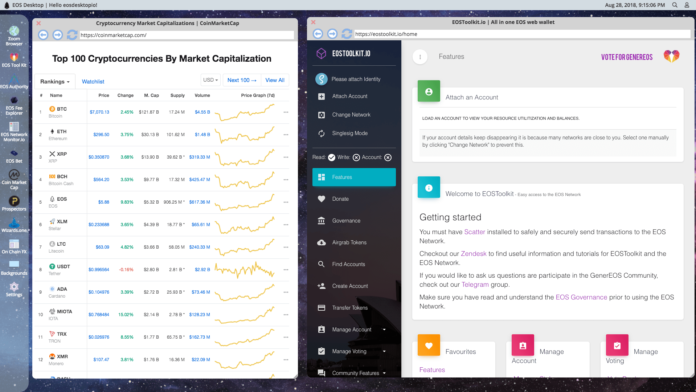
A new EOS client has been released, and it has a focus on providing a fully immersive crypto workspace. Unlike most clients, which run as a windowed application, EOS Desktop resembles a full desktop environment.
The project was developed by Errick Benson Peart, an attorney turned developer and interface designer. According to his announcement thread:
“I got tired of clicking around a bunch of sites when I was doing my crypto/EOS research. So I created EOS Desktop, a familiar graphic interface for the EOS Blockchain. All EOS dApps/sites that run the latest version of ScatterJS can be run inside EOS Desktop and connect to Scatter Desktop. It also features a light-weight browser.”
The client takes many of its cues from the Mac OSX interface, with a dockbar, flat grey window decorations, and a purple-tinted night sky wallpaper. When opened, the full screen app replaces the user’s normal desktop, and allows users to run dApps from shortcuts and view their account details in a sidebar (not shown here):
Security Matters
To manage credentials, the EOS Desktop relies on Scatter, the EOS equivalent of Metamask. Scatter itself is well tested, but EOS Desktop is still in its pre-alpha stage, so various bugs are still being identified and fixed.
One potential issue is EOS Desktop’s web browser, which is somewhat limited:
“The built-in Zoom Browser is as basic as a browser can be. Going to trusted sites like Yahoo, Reddit, Google, or your favorite dApp or blog aren’t a problem. But if you want to browse shady parts of the Internet, use Chrome, Brave, Safari, etc., which all have more robust built-in protections.”
Commenters also note that it is probably more secure for EOS Desktop to launch the user’s default browser. In addition to automatically keeping itself up to date in terms of security, a standard browser would allow users to access their bookmarks and settings.
Suggested Reading : Learn the fundamentals of EOS in our beginner’s guide.
The Desktop Metaphor
Decentralized applications, or dApps, are applications that communicate with the blockchain. Since dApps are powerful and secure, they could potentially replace traditional apps, and so it is important for developers to design dApps that work with existing interfaces in a seamless manner.
Currently, most dApps are presented as websites that ask users to install a wallet. However, this system is not without its problems. Web apps in general may not respond properly to a web browser: the back button may close a web app entirely. These UI issues may complicate matters for novice users.
Although a novel interface can automate or remove some of these issues, it’s not obvious that a desktop on top of a desktop is the best way to present a dApp. Other approaches involve a “dApp store” which collects dApps but contains its interface in the user’s web browser. This is one live example.
In any case, it will take some time for dApps to integrate seamlessly with the existing UI metaphors we are all familiar with.

Unhashed.com is author of this content, TheBitcoinNews.com is is not responsible for the content of external sites.
Our Social Networks: Facebook Instagram Pinterest Reddit Telegram Twitter Youtube










